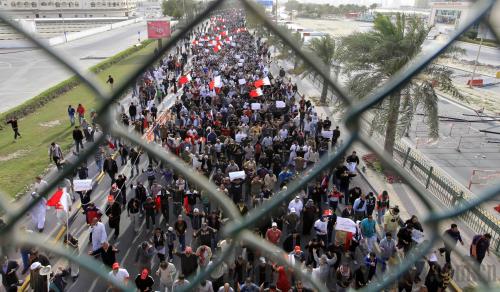|
 |
|
SPREADING DEMONSTRATIONS: Bahraini protesters demonstrate outside the Saudi Arabian Embassy in Manama on March 15 (XINHUA/AFP) |
Arab countries have drawn lessons from recent turbulence. Currently, they are making great efforts to conduct political and economic reforms, develop national economies, improve people's livelihoods, promote democracy and eliminate corruption. In the meantime, these countries are distancing themselves from the United States to foster a relatively independent image and avoid being entangled with growing anti-U.S. sentiment.
According to media reports, there is rising dissatisfaction with the United States in Tunisia, Egypt, Lebanon, Bahrain and Yemen. It is likely that future leaders in the region will be less interested in following U.S. strategies than their predecessors as they pursue more independent foreign policies.
The situation in the Middle East remains unstable. All of these problems prove that Washington's Middle East policy has failed. Perhaps the United States is the biggest loser in the regional disturbances.
Policy adjustments
Washington is worried about the current situation in the Middle East. The Obama administration's Middle East policy is constantly under fire from Republicans and the media. The White House has started to adjust its policy to help ease tensions in the region, so as to remain in control.
Washington plans to establish Egypt as an example of power transition in the Middle East. The United States was shocked by the Egyptian tempest. Nonetheless, many of the new developments in Egypt's political situation, such as the resignation of Mubarak, amendments to the Constitution, popular referendums and planned presidential elections are being lauded as steps in the right direction. The United States is now urging other countries such as Yemen and Algeria to follow in Egypt's footsteps. Meanwhile, it attempts to maintain its influence and continue antiterror operations in the region.
The United States took a leading role in actions to overthrow Libyan leader Muammar Gaddafi. It convinced the Arab League, France and the UK to take point, and prompted the UN Security Council to adopt Resolution 1973. Then it joined air strikes initiated by France. So, it pushed European countries to the front—avoiding another quagmire like Iraq or Afghanistan—while seeking to realize its ultimate goal of toppling Gaddafi. Moreover, the use of force served as a warning to Syria, Iran and Sudan by militarily intervening in other countries' internal affairs.
The United States gave a tacit consent to Bahrain's approach to maintaining stability. The situation Bahrain has been unstable since February 14, but U.S. Secretary of Defense Robert Gates still visited the country to show support. Besides, it closed its eyes when the Gulf Cooperation Council sent troops to Bahrain to aid local police in dispersing demonstrators. Western media such as the BBC also reported that the U.S. Middle East policy puts U.S. interests first, because the current regimes in Yemen and Bahrain are allies of Washington.
The United States pushed monarchies in the Middle East such as Saudi Arabia to carry out political reforms, so as to contain the shock waves brought forth by regional turbulence. The new policy can help not only quell uprisings and avoid more violence, but also sustain important strategic relations.
Recently, many nations in the Middle East have carried out reforms to improve their people's livelihoods. Saudi King Abdullah announced a series of welfare programs worth about $10.7 billion to help citizens buy homes and start businesses. Besides, the government offered subsidies to government officials and unemployed youths. Kuwait, Bahrain and Jordan also allocated money for granting subsidies, raising salaries and funding pensions.
Washington's goal is to cause the turmoil to spread to Iran, Syria and Sudan. Now demonstrations have also occurred in these three nations. The U.S. Government and media exaggerated the demonstrations, trying to instigate anti-government movements in these countries.
The author is former vice president of the Chinese People's Institute of Foreign Affairs | 